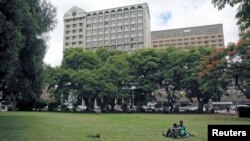In Zimbabwe, environmentalists are up in arms about the construction of shopping malls and residential housing on wetlands, which they say will affect water supplies in urban areas.
Authorities say rural-to-urban migration puts pressure on the country’s urban land resulting in the buildings on wetlands. Environmentalists say if the trend continues, the city of Harare will run dry or will need more money to purify its water from open sources.
Monavale Vlei, a 10-minute-drive southwest of Harare’s downtown, one of the few remaining wetlands in Zimbabwe’s capital city. The place is mainly covered by green grass and a few trees, unlike other parts of the city.
Officials say there are more than 250 species of birds here — some of which travel from other parts of the world.
Growth explosion
Buildings — houses or upscale shopping malls — have covered other swampy areas. Harare’s population has more than doubled in the past 10 years and is now estimated at more than 2 million. Most of the increase is due to rural-urban migration.
Another mall — dubbed southern Africa’s biggest — is set to shape up on wetlands in a posh suburb of Borrowdale east of Harare.
Jimmy Muropa, a conservation field officer is worried by this development.
“We are not against any form of development, but what we are basically saying is: those malls or houses should actually be sited on higher ground," he said. "We are for development but on appropriate ground. Simple.”
Scientists say wetlands purify and store water, which they gradually release into rivers and lakes.
Harare Residents Trust says Zimbabwe’s water rates are now high because of the destruction of wetlands.
Precious Shumba, head of the trust, said, "The monitoring framework is very weak. The Environment Management Agency does not follow laid down procedures when it comes to approval of buildings. There is so much corruption; there is no monitoring. The only relief that is available to EMA [Environment Management Agency] and the council is to charge penalties for violations. But they are not stopping; meaning to say our wetlands will continue to go."
Corruption has not been proven.
Sustainable use
The Environment Management Agency is a government board mandated to ensure sustainable use of the environment in Zimbabwe.
Environment agency spokesman Steady Kangata said his organization was trying to spread awareness of the importance of not constructing on wetlands. He dismissed allegations that Harare is lax on wetlands laws.
"Zimbabwe laws are very comprehensive when it comes to wetlands. We are part of the Ramsar Convention pertaining to proper utilization of wetlands," said Kangata. "We have even gone further to domesticate provisions of the Ramsar Convention. Wetlands are protected areas. But in the urban areas there is pressure for infrastructural development."
Wetlands conservationist Dorothy Wakeling said the wetlands are precious resources that cannot be destroyed.
"These wetlands are our only source of water. If we take all our wetlands of Harare we are taking away our water source. What are we going to do to replenish streams and rivers that feed into dams down stream? Wetlands should be left alone."
With the demand for land for housing and shopping malls increasing, however, Wakeling’s plea seems to be falling on deaf ears.




